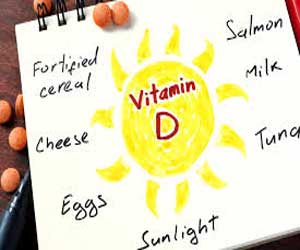- Home
- Editorial
- News
- Practice Guidelines
- Anesthesiology Guidelines
- Cancer Guidelines
- Cardiac Sciences Guidelines
- Critical Care Guidelines
- Dentistry Guidelines
- Dermatology Guidelines
- Diabetes and Endo Guidelines
- Diagnostics Guidelines
- ENT Guidelines
- Featured Practice Guidelines
- Gastroenterology Guidelines
- Geriatrics Guidelines
- Medicine Guidelines
- Nephrology Guidelines
- Neurosciences Guidelines
- Obs and Gynae Guidelines
- Ophthalmology Guidelines
- Orthopaedics Guidelines
- Paediatrics Guidelines
- Psychiatry Guidelines
- Pulmonology Guidelines
- Radiology Guidelines
- Surgery Guidelines
- Urology Guidelines
Low Vitamin D level increases blood sugar in women

Low Vitamin D is associated with increased blood sugar levels in women, according to a study. The study has been published in Menopause, The Journal of The North American Menopause Society.
Vitamin D plays an important role in bone metabolism. There is evidence now that a higher serum level of 25-hydroxyvitamin D (25[OH]D) is associated with a lower risk of developing type 2 diabetes mellitus, because it provides better glycemic control, possibly by promoting greater insulin sensitivity, and also by improving pancreatic beta cell function. The objective of the present study was to evaluate the possible association between 25(OH)D sufficiency and glycemia.
Dr Tânia Valladares, at the University of Sao Paulo School of Public Health in Brazil, and colleagues conducted a cross-sectional study involving 680 women, 35 to 74 years of age. They evaluated the possible association between Vitamin D, 25(OH)D sufficiency and glycemia with fasting blood samples. From each participant, fasting blood samples were collected for the determination of 25(OH)D and glucose levels.
Please also read-Vitamin D lowers risk of developing diabetes, finds new study
The researchers found that the mean fasting blood glucose level was 105 mg/dL (range 26-401 mg/dL). Fasting serum levels of 25(OH)D were <30 ng/mL in 65.4% of the participants and <20 ng/mL in 25.6%.There was a positive association between a serum 25(OH)D level <30 ng/mL and a blood glucose level ≥100 mg/dL, as well as for a serum 25(OH)D level <20 ng/mL and a blood glucose level ≥100 mg/dL.
The investigators found that Lower serum Vitamin D concentrations appear to be associated with high blood sugar levels.
JoAnn Pinkerton, M.D., executive director of the North American Menopause Society, said in a statement"Although a causal relationship has not been proven, low levels of vitamin D may play a significant role in type 2 diabetes mellitus. Vitamin D supplementation may help improve blood sugar control, but intervention studies are still needed."

Disclaimer: This site is primarily intended for healthcare professionals. Any content/information on this website does not replace the advice of medical and/or health professionals and should not be construed as medical/diagnostic advice/endorsement or prescription. Use of this site is subject to our terms of use, privacy policy, advertisement policy. © 2020 Minerva Medical Treatment Pvt Ltd